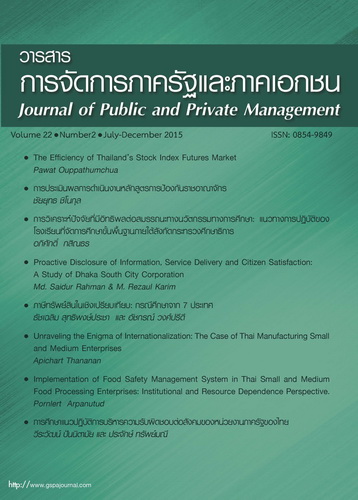Unraveling the Enigma of Internationalization: The Case of Thai Manufacturing Small and Medium Enterprises
Keywords:
Internationalization process, manufacturing industry, small and medium enterprises (SMEs)Abstract
Understanding the internationalization process of small to medium-sized enterprises (SMEs) is imperative for emerging economies to compete globally. Empirical findings of SMEs from emerging countries are still lacking. Thus, this study intends to fill this gap by providing a comprehensive model for the process of SMEs internationalization in Thailand. The pattern and dimension of internationalization, including pace, mode of foreign entry, market selection, and financing were investigated in this study as well as problems and challenges faced by SMEs and the factors influencing the internationalization process. An interpretative approach is adopted using case study method. Data from nine manufacturing firms were collected through in-depth interviews with SMEs owners and key executives. The findings indicate that traditional internationalization pattern is strongly evident in which the majority of SMEs was established on the basis of seizing domestic market opportunities before undertaking any international involvement, although some SMEs exhibited born-again global pattern as a result of occurrence of some critical events within the firm such as change of management and registration of a new company. Firms choose their main market without psychic distance reasoning. In other words, they do not choose geographically or culturally close countries as their main markets, but those with high demand and market potential. The findings showed that most of these companies opted for exporting as their preferred choice of foreign entry mode strategy as they were easier to establish, more flexible, required low resource commitments, and involved less risk. Sources of finance for international operations mainly centered on internally generated funds such as retained earnings and family contributions. The main drivers of internationalization centered on key personnel characteristics and firm competences. The finding clearly shows that while domestic and global forces motivate internationalization, aspects of government policy, political situation, and access to finance inhibit the process. A result of this study not only assist Thai government in making more informed decisions when designing their SME support programs, but also provide new knowledge and important insights to SMEs managers to improve their internationalization efforts.



